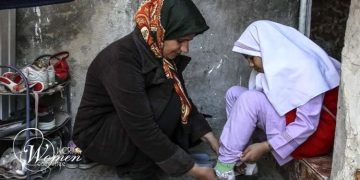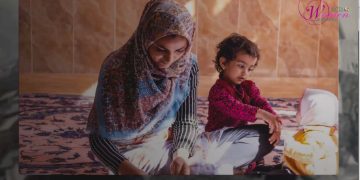Working as a porter or a “back carrier” has become a common job in western Iran under the rule of the clerical regime. A porter must carry heavy loads on his/her back and walk through the mountains to earn a living. This is a difficult job even for men, but unfortunately, in today’s Iran we see many female porters and children who are also engaged in this arduous job.
The clerical regime’s Constitution states that having “a decent job” is the inalienable right of every Iranian citizen. Article 43.2 stipulates that the social duties of the government include “providing the circumstances and opportunities for employment for everyone with the prospect of achieving full employment; making means of labor available to everyone who can work but does not have the means; this can be done through cooperatives, interest-free loans, or any other legitimate method that would not lead to the concentration and circulation of wealth in the hands of specific individuals or groups, or turn the government into a large and absolute employer.” (The state-run Baharnews.ir – September 18, 2020)
However, working as a porter is one of the main sources of revenue for villagers in the provinces of Kermanshah and Kurdistan in western Iran.
Some 4,000 to 5,000 households in the Uramanat region of Kurdistan earn their living by working as porters. The following report is a brief review of the circumstances and work conditions of female porters in these provinces.
Tough working conditions of female porters

Female porters risk their lives, climbing up the mountains and walking through difficult paths, to earn a meager living.
Most of the female porters in these regions are widows and head their own household.
These women must walk between 8 to 10 hours carrying their heavy loads. Then, after delivering their cargo, they must walk all the way back.
Despite greater difficulties, female porters earn less money than men do.
Some time ago, they went on strike to protest their low wages considering the soaring inflation. But in the end, their employers increased their wages only to around 80 to 100 thousand tomans, compared to 150 to 250 thousand toumans they pay to men.
Last year, a female porter froze to death while carrying her loads through the mountains. Since then, employers do not hire women during winter, telling them, “What will your children do if you freeze to death?”
They often must carry their loads in the dark of the night to stay away from being detected and shot by border patrols.
But, even if they manage to evade being targeted by border patrols, they still face the risk of falling from the cliffs and mountains should they make the slightest mistake.
Mother and son working as porters
Some 4,000 people live in Shamshir village near the city of Paveh, in Kermanshah Province. Most of the villagers work as porters. (The state-run Hamshahrionline.ir, September 14, 2020)
One of these villagers is Ronak Rostamzadeh. She is 38 and has two children: Mani Hashemi, 14, and Mona Hashemi, 10. Ronak is a single woman head of household.

Two years ago, Mani also started working with her mother as a porter.
After the coronavirus outbreak and closure of schools, they had to buy a cellphone so that Mani could continue his education. The only motivation for Mani to work as a porter was to collect his money to buy a cellphone to take part in online classes.
On September 16, however, Mani fell and rolled down the mountain as he was trying to escape the patrol guards who were going to shoot him.
He was badly injured breaking his nose and skull near the eye. He also suffered deep wounds. Instead of helping Mani, the patrol guards escaped and Ronak was left alone to carry her son to a medical center.
It took her a long time to carry her son to the road and find someone to drive her to the village where her brother lived. Then, they took the child to Paveh and from there to Kermanshah where doctors told Ronak that her son needed to be treated in a better equipped medical center.
Sabri carries 30 kilograms in every round
Sabri is also a female porter who carries 30-kilogram loads on her shoulders every time she goes to the mountains. She must walk through tortuous paths for about 5 hours to be able to deliver her cargo.
“I suffer from an excruciating back pain; I don’t know how much longer I can work. I had to spend all the money I had collected by working as a porter on my husband’s cancer. The money was not enough, and I had to sell my house, carpets, refrigerator, and everything I had to pay for my husband’s hospital expenses in Tehran. But finally, they handed me his (dead) body. Then, I had to start all over again, going through the mountains,” Sabri said.
Explaining about the conditions for a woman to be hired as a porter, Sabri said, “It is not easy to become a porter. There are certain conditions to meet. First, you have to be recommended by an experienced and reliable porter to gain the trust of the employer. Body physique is also important. The employer checks women to see if they are physically fit for this job. If he deems that a woman is not fit for carrying a 40-kilogram load for 10 hours, he will not accept to hire her. For this reason, most female porters are between 30 and 45 years old. Of course, there are women in their 50s and 60s.”
Carrying heavy loads despite diabetes
Sherafat is 60 years old and suffers from diabetes. Her husband died and left her alone in taking care of and providing for their five children.
Sherafat’s knees badly hurt. She rubs some ointment on them and says, “These legs will no longer be legs for me, but I have to work all summer long. I neither have a pension nor an insurance. I work as a porter all summer long, along with my sister, cousin, and the rest of the women in the family. We work in summer to save for our expenses during winter.”
Sherafat also spoke about being attacked by border patrols. She said, “Once, I was just about to die. I had been walking for 5 hours when the border patrols aimed their rifles at me. I had to throw off my load of about 40 kilograms down the valley. I started screaming and shouting, so that they would realize that I was a woman and would not shoot. But they gave me a harsh warning. The next day, I had to walk for another 8 hours through rocks and thorns to find and deliver my cargo. If the cargo is damaged or lost, we have to pay compensation to the owner.”
“I have worked as a porter for a lifetime, and I still do not understand why they kill the porters, or why they take away our loads and make us miserable. How can we afford the money to pay for compensations?” Sherafat asked with great sadness.
A mother of three children
Maryam is 45 with three children. Her husband was a worker, but he died in an accident. One of her children has hemophilia.
Maryam, her brother, her sister and other members of their family all work as porters.
“Female porters are not given very heavy loads such as household items,” Maryam said, adding, “A few years ago, a woman who had to work harder to earn more for her children, asked for a heavy cargo but she could not bear it. In the middle of the way, she fell down the valley with her load and died.”
These were but a few examples of the great suffering of numerous female porters in Iran. Obviously, they will continue to suffer so long as the mullahs’ kleptocratic regime is not replaced by a democratic government in Iran.
























